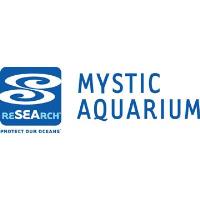In recent weeks and months, Mystic Aquarium’s colleague in animal rescue and rehab, The Marine Mammal Center, has had their hands full with hundreds of California sea lions stranding off the west coast. In fact, Mystic Aquarium’s own Erin Gibbons, Assistant Supervisor of Pinnipeds, is currently at The Marine Mammal Center in Sausalito, CA, to assist with the rehabilitation of these animals in need.Fur Seals Find Forever Home at Mystic Aquarium
“While I hate that these strandings occur, I’m incredibly fortunate to have the specialized training to be able to help The Marine Mammal Center with this important initiative to rehabilitate California sea lions,” said Gibbons. “My goal is to share my experiences on our social media channels to help inform, educate and inspire our followers to become even more aware of the plight of these beautiful animals and all the actions that we can take coast-to-coast toward species and ocean conservation.”
When not traveling across the country to lend a helping hand, she’s hands on providing world class animal care to Mystic Aquarium’s own animals including new arrivals Yura, an adult female Northern fur seal, and her pup Tuk.
Yura, who is believed to be 12-13 years old, was rescued by The Marine Mammal Center after stranding on July 25, 2018. During the evening, Yura gave birth to a male pup. Unfortunately, care takers immediately noticed signs of neurological issues in Yura. Both mother and pup were transported to Sea World San Diego for rehabilitation.
An MRI conducted on Yura showed non-reversible neurologic lesions consistent with domoic acid exposure. Ultimately, Yura was deemed non-releasable due to her seizure activity and lifelong need for anti-seizure medications.
Also home to the popular Ziggy Star, another female fur seal, it was determined that Mystic Aquarium, being uniquely qualified to care for an animal with a neurologic condition, would be Yura’s forever home.
Ziggy Star, who has called Mystic Aquarium home since 2014, was originally rescued by The Marine Mammal Center in 2013. She, too, was deemed non-releasable by the federal government as a result of a serious neurologic condition. The condition, which affects her ability to process images correctly and coordinate her movements, would have ultimately impacted her ability to survive in her natural habitat.
In 2017, a cluster of seizures prompted the animal care professionals at Mystic Aquarium to conduct advanced brain imaging on Ziggy Star. An MRI revealed an accumulation of cerebral spinal fluid in the brain, a condition known as hydrocephalus. To prevent further deterioration, a neurosurgical team at Cummings School of Veterinary Medicine at Tufts University, in collaboration with Mystic Aquarium’s veterinary team, successfully performed brain surgery on Ziggy Star on November 20 of that year.
Today Ziggy is seizure-free. The shunt, which was surgically placed in her brain, is successfully draining any excess fluid and minimizing any pressure on the brain. She swims daily and exhibits her normal swim patterns and ability to navigate as well as the cognition/mentation to complete simple behaviors as requested by her care team.
Gibbons has been and continues to be one of Ziggy’s primary care givers.
Ziggy regularly socializes with her fellow Northern fur seal ambassadors, Kivli, Avila and Adak. Today she is joined closely by Yura as well. The duo receives specialized and compassionate care in a large habitat off-exhibit. Occasionally Ziggy can be seen visiting the Pacific Northwest habitat that also includes harbor seals. The goal is to also have visits from Yura as well.
“Yura is on seizure medications and has been doing great since arriving at Mystic,” said Dr. Jen Flower, Chief Clinical Veterinarian. “We are happy to report that she has not experienced any seizures.”
Joining the colony is Tuk, Yura’s young pup. Since Tuk was born in human care and required immediate hand-rearing by animal care professionals due to his mother’s condition and because there are concerns regarding exposure to domoic acid in utero, he was also deemed non-releasable by the government. After several months of standard quarantine and weeks of meticulous and managed acclimation, Tuk has seamlessly worked his way into the social group of fur seal pups and all four can be seen interacting in the Aquarium’s Pacific Northwest habitat.
“The very first night Tuk was on habitat, Adak let him sleep right next to him,” said Gibbons, “and all four can be seen actively engaged in a strong social grouping.”
Domoic acid is a neurotoxin produced by a variety of marine algae or diatoms. The toxin is produced in large quantities during algae blooms and is then consumed by fish and shellfish. It does not kill the fish or shellfish but, if eaten by birds, man or other mammals, can produces systemic poisoning.
Humans exposed to domoic acid could develop a syndrome called Amnesic shellfish poisoning.
Mystic Aquarium enjoys the privilege of caring for one of the most unique and diverse group of animals including the Northern fur seals, California sea lions, Steller sea lions and many, many more. All the amazing species ambassadors foster meaningful and engaging connections with children and families with the fundamental goal of educating and inspiring future generations as stewards of our ocean planet.
About Mystic Aquarium
Mystic Aquarium, a nonprofit 501(c)(3) organization, is counted among the nation’s leading aquariums, offering exemplary care to a variety of species while also serving as the northeast’s premier marine mammal rescue and rehabilitation center. Robust conservation and education programming along with unparalleled visitor experiences serve to strengthen personal connections to the animals and their environments. The mission of Mystic Aquarium is to inspire people to care for and protect the ocean planet through conservation, education and research, and introduces approximately 800,000 guests annually to thousands of animals through structured interpretations, specially-curated exhibits and hands-on interactions. As a leading research organization, Mystic Aquarium employs a full staff of scientists engaged in projects focused on the conservation and sustainability of our ocean planet.



